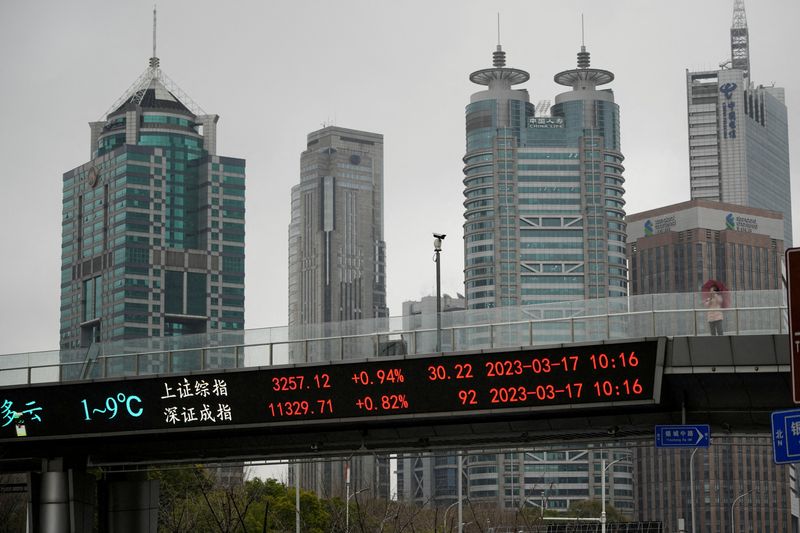By Summer Zhen
HONG KONG (Reuters) - Investors in Chinese stocks next year will be seeking out businesses with global reach or other insulation from an economic downturn, after three straight years of China underperforming world markets.
Companies in defensive sectors such as health, medical innovation and exporters in the electric vehicles supply chain and advanced manufacturing, as well as multinationals such as e-commerce firm PDD Holdings, will top the list.
That's despite sell-side analysts turning bullish on China's broader market for next year, with Morgan Stanley and Goldman Sachs forecasting Chinese equities to outperform the S&P 500.
"Since economic recovery is slower than expected, we lowered exposures which are sensitive to macro cycles," said Wang Qing, chairman at Shanghai Chongyang Investment Management.
Chongyang is instead buying defensive high-dividend stocks, medical innovators with global competitiveness, and advanced manufacturing backed by Beijing, Wang said, declining to list any investments by name.
This follows China's blue chip CSI300 index sinking to five-year lows and losing 12% over 2023 against a 15% gain for global stocks as the Chinese economy struggled with a property crunch and a slow recovery from COVID-19.
Hong Kong's Hang Seng fared even worse, sliding more than 18% to trade on a forward price-to-earnings ratio below six, against 21 for the S&P 500.
Performance over the last 10 months crushed the optimism that infused the beginning of the year, with four straight months of foreign outflows in the second half of the year totalling a net 138 billion yuan ($19 billion) withdrawn from Chinese equities via the Stock Connect scheme.
"Investors (have) struggled to think what the next growth driver for China will be," said Caroline Yu Maurer, head of China and specialised Asia strategies at HSBC Asset Management.
Goldman analysts target 4,200 for the CSI300 by the end of 2024, up 23% from Monday's close at 3,419. Morgan Stanley forecasts the blue chip index at 3,850 at the end of next year and the Hang Seng - which finished Monday at 16,201 - at 18,500, up 14%.
In contrast, Goldman sees the S&P 500 up less than 2% from current levels to 4,700 by the end of next year. Morgan Stanley sees it falling to 4,500. [MKTS/GLOB]
EXPORTERS AND MULTINATIONALS
Real estate is casting the longest shadow. The sector that once accounted for a quarter of China's economy is reeling from a series of developer failures and a crisis of confidence that fund managers want to see resolved before they commit capital.
Moody's (NYSE:MCO) slapped a downgrade warning on China's credit rating last week, in part due to the property malaise. Shares of Country Garden, once China's biggest private property developer and now battling to service its debt, are down 73% this year.
The Hang Seng index of mainland developers is down 44%.
With the property shock ricocheting through the economy and dampened consumption, Morgan Stanley estimates the number of MSCI China companies missing analyst earnings expectations in the third quarter was the most since 2018.
New York hedge fund Indus Capital Partners is among several investors turning away from exposure to China's domestic demand.
We see value in "some exporters and multinationals, and cheap (state-owned enterprises) aligned with and otherwise not of great concern to the government," said Indus partner John Pinkel, without naming specific companies.
The stock of PDD, which owns U.S.-based shopping app Temu, for example, is up 75%. Discount retailer Miniso also has a global footprint and its shares are up 80% this year.
Global asset manager Invesco is overweight on Chinese assets in its Asian portfolios, and strategist David Chao highlighted the attractiveness of global expansion, citing the success of Japanese companies abroad while growth slowed at home.
To be sure, there are bargain hunters.
Wenli Zheng, a portfolio manager at T. Rowe Price, says shipmakers have record orderbooks and the timing is ideal to buy good but perceived economically sensitive companies that are trading cheaply, such as Kanzhun, a recruiter, or mall operator China Resources Mixc Lifestyle.
Jefferies said it has turned "tactically positive" on China given an appreciating yuan and cheap valuations, and LSEG data shows sellside analysts think Chinese firms will see their strongest earnings expansion in seven years in 2024.

Yet BofA Securities' November survey of 265 Asia fund managers found a majority are either waiting for improvement or looking elsewhere, suggesting no rush to add to their exposure to China.
($1 = 7.1872 yuan)